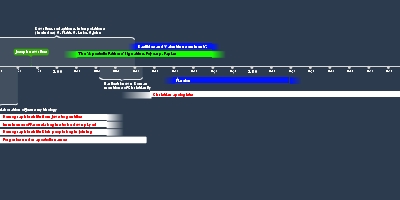Montanism | Anti-Montanist writers (jan 1, 160 – dec 31, 229)
Description:
Claudius Apollonaris (160-180 CE) is said to have been bishop of Hierapolis, to have written polemics against heresies (including Montanism), and to have published an apology for Marcus Aurelius (Jerome mentions the apology as well). Only a few extracts of his writings survive, the longest of which relates to the date of Jesus’ death.In extant writings, Montanism is first mentioned by Irenaeus ~180 CE as an exclusionary, modern-day prophetic sect. By the late second century, the Montanist movement had apparently become sufficiently numerous or influential to warrant rebukes from multiple proto-orthodox writers.
An Anonymous Anti-Montanist (193 CE) writes a treatise against the movement, comparing its prophetic activities and authority unfavorably against the proto-orthodox sect. He describes it as originating in a village in Phrygia near Mysia, when Montanus began speaking in ecstatic prophecy, followed later by two women. They drew various adherents to them and were condemned and ostracized by other Christians in the area. There was a failed attempt to reason with (or otherwise silence) “the spirit” in Maximilla by bishops Zoticus of Comana and Julian of Apamea. Mentions a Montanist writer named Asterius Urbanus, a (post-Monatnus?) leader named Themiso, and an apparently prominent Miltiades who became the namesake of the movement (same Miltiades as mentioned in the Muratorian Fragment?). Cites reports that Montanus and Maximilla both hung themselves in an ecstatic frenzy (the latter thirteen years ago), and a Theodotus who became a “steward” of their prophetic movement and also died “miserably”. Montanists continue to pose an issue for churches in Galatia and Phrygia; the author was among a group who personally disputed with them in Ancyra. Mentions another proto-orthodox author named Alcibiades who may have written against the Montanists. Affirms that adherents of the Montanists, Marcionites, and other “heresies” have suffered martyrdom alongside the proto-orthodox.
Serapion, bishop of Antioch (200-210 CE) writes against Montanism. The work is addressed to a Caricus and Pontius; it is supposed to have circulated amongst bishops in Asia and Thrace. It referenced the earlier work by Claudius Apollonaris.
Apollonius of Ephesus (200-210 CE) writes a fiery polemic against the leaders of Montanism, accusing Monatnus, and the "prophetesses (Priscilla by name) of greed and grift, and a Themison (probably the "Themiso" of the Anonymous Anti-Montanist) of having dodged martyrdom and then writing an epistle to instruct his betters in matters of faith. He also condemns Montanus for associating with a certain Alexander, a convicted robber who grifted Christians and somehow got free, later designating himself a martyr.
Caius (200-230 CE) is another anti-Montanist writer of the time, who authored a work in disputation against one Proclus.
Pseudo-Hippolytus (217-222 CE) claims that the Montanists can be traced to the Phrygians, as a sect that originally heeded two prophetesses named Priscilla and Maximilla before falling under the leadership of Montanus (reverse sequence of events as the Anonymous Anti-Montanist); they accept all Christian dogma but believe in ongoing and superior revelation from the Holy Spirit.
---
Added to timeline:
Date:
jan 1, 160
dec 31, 229
~ 70 years
